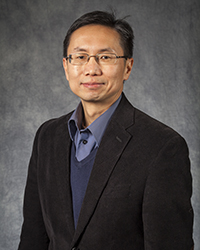
Wilson Meng
Appointment Rank: Affiliate
Wilson Meng is an affiliate faculty of the McGowan Institute and Professor of Pharmaceutics in the Division of Pharmaceutical Sciences at Duquesne University. He is an expert in developing drug delivery technologies for modulating immunological functions in disease states that include cancer and autoimmunity. Meng is applying biomaterials science and pharmacokinetics modeling to advance the understanding of controlled delivery of monoclonal antibodies and fusion proteins and immune mechanisms in vivo and in organoids.
The Meng group pursues studies that bridge gaps between preclinical and clinical stages in drug development, focusing on enhancing drug bioavailability in target tissues while reducing systemic toxicities. The overarching theme is to integrate formulation designs, pharmacokinetics and pharmacodynamics, and immunogenicity in the development of pharmaceutical proteins. A central goal of the lab is to repurpose biologics for locoregional immunomodulation.
Meng is a member faculty of National Institute for Pharmaceutical Technology and Education (NIPTE), a national consortium of academic institutions that aims to advance new manufacturing technologies and promote pharmaceutical workforce development. He has served as grant reviewer for the National Institutes of Health (P01, U19/U01, and standing study sections) and the Department of Defense (CDMRP).
Meng was awarded the University’s president’s award for excellence in scholarship and the creative teaching award. A holder of the William Patrick Power, C.S.Sp., Endowed Chair in Academic Leadership, he has served as Division Head since 2020.
Meng holds a B.S. in pharmacy from the University of Maryland and practiced as pharmacist in Baltimore and Los Angeles. He earned a Ph.D. in pharmaceutical sciences from the University of Southern California, where he deciphered the solvent-mediated interactions in peptide-MHC complexes with Ian Haworth and Hermann von Grafenstein. He then completed a postdoctoral fellowship at UCLA School of Medicine in the laboratory of James Economou, where he discovered novel human CD8 T cell epitopes derived from alpha fetoprotein, a tumor-associated antigen, and advanced a prime-boost DNA immunization strategy in mouse models of cancer.

Figure caption: Clustering of fibroblastic reticular cells (FRCs) by functionalized self-assembling peptides into 3-dimensional stromal structures (Velankar et al, 2024). The clusters serve as building blocks of proto-lymph node organoids for studying T and B cell differentiation and polarization in response to pathogens and alloantigens.
